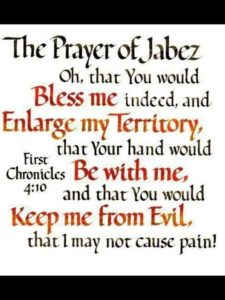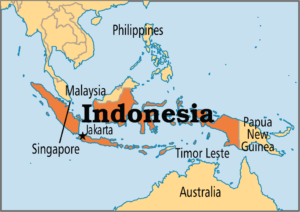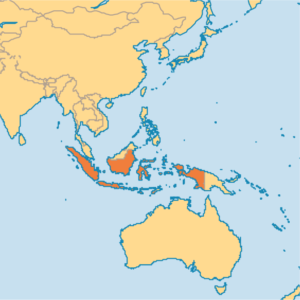TODAY’S READING FROM THE OLD TESTAMENT- 1 CHRONICLES 4:5-5:17
As the chronicler lists the genealogies of the tribe of Judah, we read of Jabez.
1 Chronicles 4:9 9 Jabez was more honorable than his brothers, and his mother named him Jabez saying, “Because I bore him with pain.”
Ironically, Jabez is listed with no reference to the names of father, mother, or siblings. We know his mother gave birth to him in pain and therefore named him “Jabez”, meaning “sorrow”. The only thing we learn about him is that he prayed and God answered his prayer.
1 Chronicles 4:10 10 Now Jabez called on the God of Israel, saying, “Oh that You would bless me indeed and enlarge my border, and that Your hand might be with me, and that You would keep me from harm that it may not pain me!” And God granted him what he requested.
His prayer request was that God’s hand of blessing would be upon his life in such a way that his life would not be a ‘sorrow’, ‘a pain’, but a ‘joy’. He asked that he would not be limited to what he inherited of a name in the genealogy of Adam, the natural man, but that the Lord would enlarge his territory beyond what was originally allotted to him. This is a prophetic picture of the provision in the New Covenant for believers to be delivered from the bondages we inherited in Adam. His prayer request anticipates a new inheritance. Our borders are enlarged in the covenant that God made with His Son. In Christ we are blessed with every spiritual blessing in the heavenly realms (Ephesians 1:3).
Jabez’s prayer is not meant to be a model prayer. It is not given in Scripture to be repeated verbatim as a formula for blessing, or a prayer to be recited habitually. Some have used “The Prayer of Jabez” as a prayer formula to be repeated daily, something Jesus warned against (Matthew 6:7). The prayer is included in Scripture as an example of a man who rose to dignify the trial of his inherited circumstances by asking God to bless him in such a way that his natural allotment in life would be transcended. It is an example of prayer, not a model prayer. Those who make it a model prayer are taking the Bible narrative and making it normative. When Jesus taught us to pray, he did not tell us to ‘pray the prayer of Jabez’. He did not even give us specific words to recite. He did not say: “Pray this prayer”. He said, “Pray, then, in this way.” (Matthew 6:9). When He gave ‘The Disciples’ Prayer’, it was meant to be a guide, so we could pray in the Spirit, from the heart with requests that are rightly aligning to the truth of Who God Is (hallowed be thy name), His kingdom agenda (thy kingdom come, thy will be done) a heavenly perspective (on earth as it is in heaven), looking to the Lord for our daily provisions (give us this day our daily bread) with an ungrieved spirit (we are rightly relating to the gospel’s truth about forgiveness) and recognizing our need for God’s preserving power to keep us from temptation and the snares of the evil one (lead us not into temptation and deliver us from evil). (See Matthew 6:9-13; Luke 11:1-5)
As we read the genealogy in 1 Chronicles, we come across more craftsmen in the tribal line of Kenaz, Caleb’s younger brother. Seraiah was the father of Joab, the father of Ge Harashim. Harashim means “valley of craftsmen’, and was named because of the talents belonging to its inhabitants. (1 Chronicles 4:14).
The Caleb we read about in the Book of Joshua is listed in 1 Chronicles 4:15. We get to know the names of his family members.
One of Ezrah’s sons, Mered, marries a Pharaoh’s daughter (4:18).
Shemei has quite a sizable family of 22 children (4:27).
In Chapter 5 we are reminded that Reuben forfeited his rights as firstborn son of Jacob due to defiling his father’s marriage bed (Genesis 35:22). This betrayal angered Jacob to the degree that he transferred the right of the first born to the sons of Joseph, Ephraim and Manasseh.
It is encouraging to read of those who call out to the Lord in the day of battle and experience His deliverance (1 Chronicles 5:20).
TODAY’S READING FROM THE NEW TESTAMENT – ACTS 25:1-27
We are reminded of God’s sovereign purposes even in times when we feel ‘stuck’. Paul had broken no law, was illegally arrested, beaten, and imprisoned. Although he was exonerated, and rescued from being victim of a murderous plot, he was taken as a prisoner to the Praetorium in Caesarea and held in custody for 2 years. Paul wanted to get on with his ministry. He knew that he had respected the law of the land and the law of God. Therefore, his conscience was clear. He had been given a promise that he would take the gospel to Rome. But when? How? This confinement must have been especially difficult for this man of action.
Like Job, or the Psalmists, he might have cried out to God, “How long, O Lord?”
He knew that God had put him in this situation, no matter how uncomfortable or inconvenient, for His purpose, and he looked for every opportunity to testify of the gospel.
Once again Paul makes his defense against the three major charges that the chief priests and Jewish leaders were making against him, as Festus calls for another hearing in Caesarea. (He wisely refuses to give in to the chief priest’s request to bring Paul to Jerusalem).
Acts 25:8 8 while Paul said in his own defense,
- “I have committed no offense either against the Law of the Jews
- or against the temple
- or against Caesar.”
Because Paul wants to be heard and given a fair trial as a Roman citizen, he exercises his right to appeal to Caesar and therefore be tried in Rome.
A few days later King Agrippa and his sister/wife Bernice arrive in Caesarea. Agrippa asks to hear Paul’s case, out of curiosity. Festus asks for their help in how he should sum up Paul’s case in his letter to Caesar, seeing that there are no charges deserving of death.
In the next Chapter, we will hear Paul’s defense.
TODAY’S READING FROM THE BOOK OF PSALMS- PSALM 5:1-12
The holiness of God comes across in Psalm 5. God has zero tolerance for sin (5:4-6), yet He has a heart for offering mercy (5:7).
Notice the prayer request: Lead me in your righteousness.
This is an imprecatory Psalm. The word ‘imprecate’ means ‘to pray evil against’ or ‘to invoke a curse upon’. They jar our sensitivities when we think of the Lord’s counsel to “love our enemies” and “pray for those who treat us despitefully”.
The Asbury Bible Commentary makes this note:
“Contemporary readers, particularly those in more affluent societies, can allow these prayers to help them enter the suffering life of the people of God, to transport them from their relative ease into the ghastly suffering and consternation of persons who have been uprooted, mocked, or abused. These prayers awaken the conscience to the human cry for redress, the cosmic demand for moral order and justice. They can lead one to feel as deeply as one ought the horrendous insult to Yahweh and his creation perpetrated by those who lie and cheat and kill and abuse and blaspheme. Made callous by exposure to continual evil, one may lose the sense of outrage these evils deserve, whether done to us or to others or to God. These prayers awaken that outrage, which is to be offered to God and which motivates to redemptive action.”
These prayers can also articulate our own disquiet when we are caught in the agony and emotional upheaval of life’s incongruities and injustices. When, for whatever reasons, we find ourselves unable to appropriate the mind of the Master for “the enemy,” these prayers can provide a place of prayer from which to start, leading through the desire for vengeance to the prayer for blessing and redemption to which we are called.
TODAY’S READING FROM THE BOOK OF PROVERBS: PROVERBS 18:19
Proverbs 18:19 19 A brother offended is harder to be won than a strong city, and contentions are like the bars of a citadel.
PRAY FOR THE NATIONS- INDONESIA
Indonesia
Republic of Indonesia
Asia
For a prayer cast video click this link:
https://prayercast.com/indonesia.html
Geography
Area: 1,919,317 sq. km
The Republic’s 17,500 islands (6,000 inhabited) stretch over 9.5 million sq. km of the Indian/Pacific Oceans, with 33 provinces, 5 of which have special status. Includes the world’s second-largest rain forest and vast coral reefs.
Population: 232,516,771 Annual Growth: 1.19%
Capital: Jakarta
Urbanites: 53.7%
HDI Rank: 111 of 182 (UN Human Development Reports 2009)
Peoples
Peoples: 784 (26% unreached)
Official language: Indonesian (Bahasa Indonesia). Its increasing use is unifying the nation and lessening the importance of smaller languages to the younger generation Languages: 722
Religion
Largest Religion: Muslim
| Religion | Pop % | Ann Gr | |
| Christians | 36,853,908 | 15.85 | 1.6 |
| Evangelicals | 13,010,751 | 5.6 | 2.8 |
| Muslim | 186,734,219 | 80.31 |
Challenges for Prayer
A spiritual conflict rages for Indonesia. Ancient and strong occult powers seek to oppose the influence of the gospel, while modern Muslim stratagems seek to eliminate Christianity and remove the presence of the good news. Pray specifically for the binding of these powers and for continued growth of the Church in the midst of intense opposition and growing persecution.
PRAYER: Lord, there are times we cry out ‘How long?” Help us to realize that Your delays and not denials. We affirm that Your plan and purposes will bring glory to Your Name and benefit to those who trust You. We look to You for Your provision in the New Covenant to enable us to transcend the limitations of our Adamic inheritance. We thank You for these examples of prayers being answered. You hear our voice as we lay our requests before You and wait in expectation. In Jesus’ Name. Amen.
Pastor David
